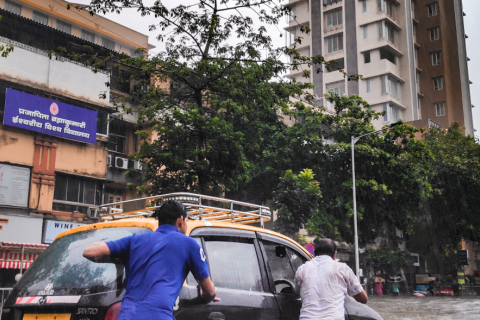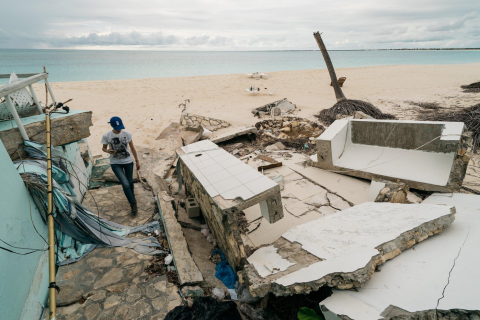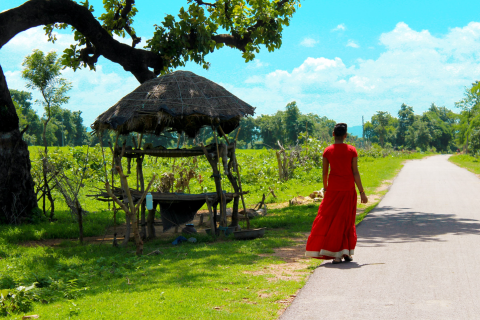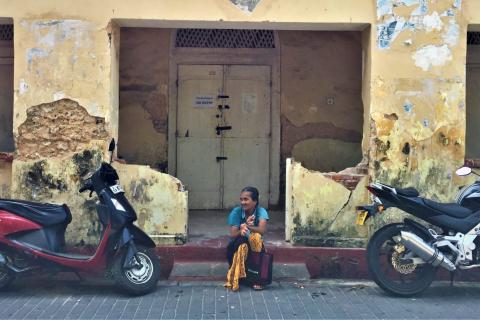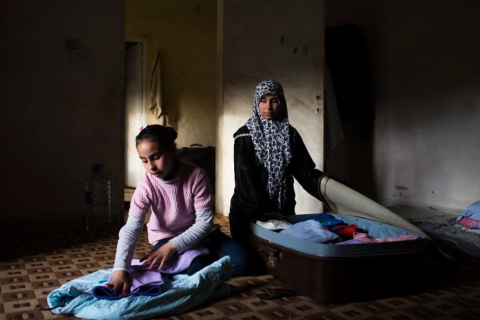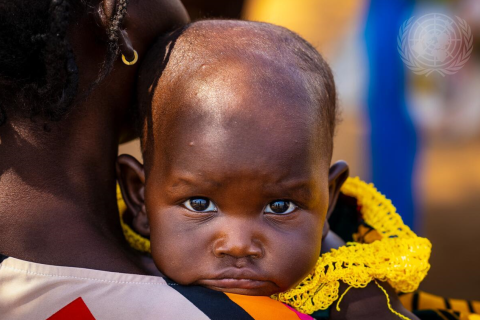
Policy Briefs
UN DESA experts are working to help decision makers around the world navigate tough choices and to find ways to recover better from the COVID-19 crisis and prepare for complex and compounded risks in today's interconnected world.
Watch this space for the latest research, analysis and policy advice from UN DESA, an effort to support and complement the United Nations Secretary-General’s initiatives in response to the COVID-19 crisis, Decade of Action to deliver the Sustainable Development Goals and call by the Member States to advance Our Common Agenda.
UN DESA Policy Brief No. 143: Caregiving in an ageing world
Rethinking approaches to long-term care will benefit today’s older persons and those who care for them, but also future generations of older persons. Countries should consider a more equitable, person-centred approach to care, operating across governments, businesses, civil society, communities and households to address needs in the provision of both formal and informal care.
UN DESA Policy Brief No. 142: Old-age poverty has a woman’s face
An agenda on gender equality aimed at reducing women’s poverty, including in old age, should promote women’s labour market participation and decent work, ease their care burden and improve women’s pension coverage as well as pension adequacy.
UN DESA Policy Brief No. 141: A just green transition: concepts and practice so far
A globally just transition requires international support for developing countries that takes into account their’ realities, capacities, and priorities. Greening measures and strategies shouldn’t push people in other countries behind.
UN DESA Policy Brief No. 140: A World of 8 Billion
Wealthy countries and the international community should support sustainable development in low-income and lower-middle-income countries by providing the necessary technical and financial assistance so that their economies can grow rapidly using technologies that minimise environmental harms.
UN DESA Policy Brief No. 139: Strengthening Disaster Risk Reduction and Resilience for Climate Action through Risk-informed Governance
Ensuring risk-informed governance for climate action requires citizen-centric approach through the whole-of-society and whole-of-government approaches including the leverage of government innovation and frontier technologies for DRR and resilience.
UN DESA Policy Brief No. 138: Improving the criteria to access aid for countries that need it the most
The COVID-19 crisis has brought to the fore the need to better account for the multidimensional vulnerabilities of countries in the allocation of aid.
UN DESA Policy Brief No. 137: Ensuring SDG progress amid recurrent crises
SDG progress has been set back, and the outlook faces uncertainty given the cumulative and amplified impacts of the COVID-19 pandemic, the war in Ukraine and climate change. The crises impact all countries, albeit unequally.
UN DESA Policy Brief No. 136: Promoting non-discrimination in public administration: some entry points
The promotion of non-discrimination needs to be formally mainstreamed throughout public administration. This brief examines a limited selection: citizens’ charters, public procurement, positive duties, institutional culture, artificial intelligence, workforce diversity, schools of public administration, and public audits.
UN DESA Policy Brief No. 135: Cryptoassets and so-called “stablecoins”: Where do we go from here?
While they have been touted for their potential to increase the efficiency of financial transactions and to support financial inclusion, their high volatility and largely unregulated and quasi-anonymous nature has raised concerns over investor protection and financial integrity, and increasingly also financial stability and international spillovers.
UN DESA Policy Brief No. 134: The Great Finance Divide
Developing countries will need reliable access to affordable financing, and also need to manage and use these resources well to translate financing into SDG progress, enhanced productivity and fiscal capacity to service debt.
UN DESA Policy Brief No. 133: Migration Trends and Families
It is indispensable to incorporate a family perspective into migration policy analysis. Since families socialize and provide economically and emotionally for the next generation, they should be seen as essential for migrants’ integration into new societies. Thus, policies facilitating family reunification, social protection and intergenerational support are key in successful integration.
UN DESA Policy Brief No. 132: Data for now: leveraging innovative sources, technologies and methods for better, more timely and disaggregated data for sustainable development
The Data For Now initiative is supporting countries in developing their capacity to leverage innovative sources, technologies and methods to deliver better, more timely and disaggregated data for sustainable development.
UN DESA Policy Brief No. 131: Credit rating agencies and sovereign debt: Four proposals to support achievement of the SDGs
Credit ratings play an important role providing information on sovereign borrowers. But financial markets, including credit ratings, often over-emphasize short-term economic concerns, and underweight longer-term issues, including environmental and social risks as well as investment in resilience and sustainability.
UN DESA Policy Brief No. 130: Why population growth matters for sustainable development
World population continues to grow and is expected to peak at a level of almost 11 billion around the year 2100. Most of this growth will take place in low-income and lower middle-income countries.
UN DESA Policy Brief No. 129: The monetary policy response to COVID-19: the role of asset purchase programmes
Central banks have relied heavily on unconventional monetary policy tools, especially large-scale asset purchases, to respond to the pandemic. These programmes have helped to stabilize financial markets and kickstart economic recovery. But the central bank asset purchases have also contributed to an underpricing of risk and sharp increases in asset prices.
UN DESA Policy Brief No. 128: Addressing climate change through sport
Climate change is one of the most pressing issues of our times. Sports plays an important role as part of the solution.
UN DESA Policy Brief No. 127: COVID-19 pandemic disruption - Implications on the full deployment of the United Nations Legal Identity Agenda
Countries are urged to implement the UN Legal Identity Agenda model as matter of priority to establish the necessary interoperability between various government’s components for effective monitoring and assessing impacts of policy decisions.
UN DESA Policy Brief No. 126: Partnering with the private sector towards a future of sustainable transport
Documenting more evidence around post-COVID 19 transport measures can provide useful references in revamping transport systems.
UN DESA Policy Brief No. 125: Improving compatibility of approaches to identify, verify and align investments to sustainability goals
Regulators and other market participants have introduced a variety of mandatory and voluntary approaches to help investors align investments with sustainability goals.
UN DESA Policy Brief No. 124: Integrated National Financing Frameworks – moving towards financing policy integration
INFFs have an important role to play both in the immediate response to the current crisis and in rebuilding better. Integrated financing strategies can serve as a starting point for locally driven reform processes, providing a foundation for action.
 Welcome to the United Nations
Welcome to the United Nations




